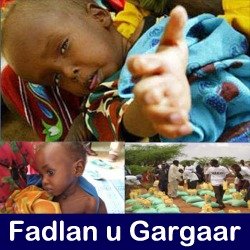 In recent days Somalis have been demonstrating in Mogadishu and in all major cities across Somalia as well as in the neighbouring countries, particularly in Nairobi Kenya. These demonstrations could be interpreted as a way of expressing powerlessness and discontent on how foreigners time after time meddle in Somali affairs. Not a soul can refute the fact that most Somalis are weary of unwarranted foreign meddling in our internal affairs will it be our sea, airspace and land. Nevertheless, things changed, for the first time in many years, Somalis lost their sense of fear and they were visible in large numbers on the streets of Mogadishu and across all major cities with the exception of Somaliland of course. The aforementioned demonstrations gave hopes to many Somalis, since they were not clannish in nature. Somalis regardless of class and clan affiliation demonstrated spontaneously for one common cause which was to shore up support for their Prime Minister.
In recent days Somalis have been demonstrating in Mogadishu and in all major cities across Somalia as well as in the neighbouring countries, particularly in Nairobi Kenya. These demonstrations could be interpreted as a way of expressing powerlessness and discontent on how foreigners time after time meddle in Somali affairs. Not a soul can refute the fact that most Somalis are weary of unwarranted foreign meddling in our internal affairs will it be our sea, airspace and land. Nevertheless, things changed, for the first time in many years, Somalis lost their sense of fear and they were visible in large numbers on the streets of Mogadishu and across all major cities with the exception of Somaliland of course. The aforementioned demonstrations gave hopes to many Somalis, since they were not clannish in nature. Somalis regardless of class and clan affiliation demonstrated spontaneously for one common cause which was to shore up support for their Prime Minister.
Prior to these demonstrations Somalis were prisoners of warlords and clan leaders. Moreover, it is crystal clear and beyond any reasonable doubt that clannish politics has failed and it is doomed to fail no matter how hard we try to use it. In reinforcing this argument the failure of the Somali state itself could be partially attributed to clannish politics coupled with misuse of power, in the form of nepotism, corruption and dictatorship. When the Somali regime was ousted in 1990 many Somalis had high hopes. However, their hope evaporated in a matter of few weeks. Anarchy ensued, the driving vehicle and the culprit being the ‘clan card’ that was being applied by various clan leaders and warlords. Here are few examples on how the clan card is tainted with bad experiences.
Numerous writers point out that since 1990s various Somali militias applied different strategies such as clan affiliation and religious ideologies to mobilize supporters. Armed with these powerful mobilizing instruments they embarked on looting spree. They looted farms, properties, factories, statues and monuments, hospitals and even cemeteries were not spared. With regards to looting of cemeteries one specific example is the remains of WW2 Italians who had been buried in Somalia. The Italian tombs got exhumed (BBC News, 2005). The Italian government had to pay ransom in order to get the remains of their citizens for proper reburial in Italy. When all land resources had dwindled the sea became the next target.[1] The militias who were in power at that point in time in Somalia collaborated with greedy foreign actors by issuing fishing licences and accepting toxic wastes from European firms since it was cheaper and cost effective for these firms to dump their deadly cargo in Somalia. Somalis these days call greedy Somali war profiteers as “hunguri-lords” which literally means “greed-lords” for further details (see Hussein, M. B. (June 2010), The Evidence of Toxic and Radioactive Wastes Dumping in Somalia and Its Impact on the Enjoyment of Human Rights: A Case Study. Available: https://somalitalk.com/sun/toxic_waste_dumping_somalia.pdf. Last accessed 11.7.2010).
Additionally, Hussein, claims that it has been documented that in 1990s Somali warlords had been accepting toxic waste dumping from foreign companies in exchange for arms and ammunitions and this prolonged the Somali civil war. According to him these factors represent the main pillars that underpin the war economy that has taken its root in Somalia since 1990s.
Coming back to the topic, Somalis have once again defied the clan card. It seems to me that today’s Somalis are all united in the quest for restoring their lost glory and dignity. Through unity we can overcome our obstacles, will it be domestic problems or external forces that have being undermining our efforts for so long. At the same time it will be difficult if not impossible for our nation building endeavour without the help of the International Community. Furthermore, we are all familiar with the failures and dreadful experiences we have had in our dealings with the International Community.
In addition, we will also need to shed some light on why the International Community is meddling with our affairs? The answers to this question are many, but due to space and relevance to the topic at hand I will confine myself to statelessness. With the collapse of the Somali state all aspects of social services and the security-sector institutions that might have protected the country, its resources, and its citizens against internal and external threats vanished. The lack of governance and human security created a laissez-faire environment on land and at sea that offered Somalis not only incentives to take part in criminal enterprises but also sanctuaries from which to do so (Warner, 2010).[2] Besides, on the question of collapsed social services and poor economic performance Patrick, (2006) argues that, poorly performing nations generate cross-border ‘spillovers’, including terrorism, weapons proliferation, organized crime, regional instability, global pandemics, and energy insecurity.[3] For these reasons and other reasons the International Community will never walk away from Somalia. The International Community’s interests are not logical construct. It is the result of many, often competing interest, some by ideology, some by altruism etc. How we act and adapt to these factors are crucial for our survival. A Somali proverb goes by ‘ Sidee xeero loo xagtaa ilkona loo badbaadshaa’ which literally means ‘ how do you scrap food from the bottom of a pan and save your teeth’. We need ways of dealing with them while protecting our rights and interests. My personal assessment is that such audacious moves require informed citizenry, unity and strong leadership. We have a bumpy road ahead of us but it is never too late. We have to start somewhere and the signs are not that too bad after all.
Ahmed Hirsi Edmonton Green London Uk
MSc Political Economy of Violence, Conflict and Development
Ahmed.hirsi@yahoo.com
[1] Olad, M. (2005), Somali militias target cemetary. Available: http://news.bbc.co.uk/1/hi/world/africa/4187097.stm. Last accessed 19.6.2010.
[2] Warner, L. Anne. (2010), Pieces of eight: An appraisal of U.S Counterpiracy Options in the Horn of Africa. Naval War Collage Review. 63 (2), 61-87.
[3] Patrick, S. (2006), Weak States and Global Threats: Facts or Fiction?. The Washington Quarterly. 29 (2), 27-53.




































comment closed after 30 days / Jawaabaha waa la xiray ama waa la joojiyay wixii ka badan 30 cisho.